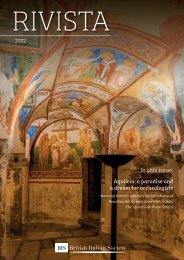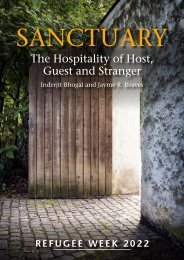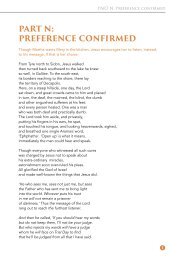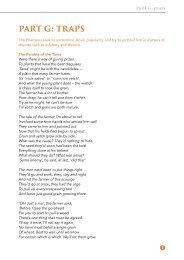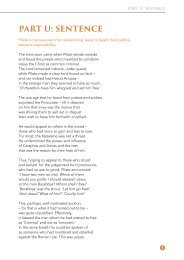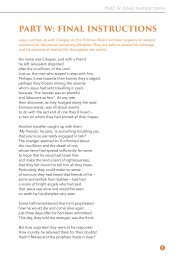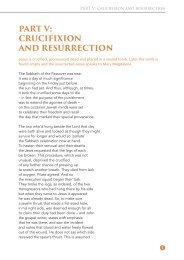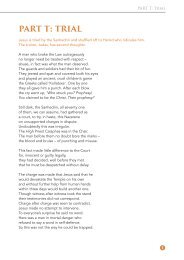Journeying spiritually with children
To see life afresh through the eyes of a child, to be challenged by their questions and invigorated by their energy and sense of fun is surely a precious gift in adult life. The selection of readings in these booklets invite us to reflect on both the complexity and the simplicity of a life lived with openness to the perspectives of the young amongst us - from the wonder of birth to the empty nest and beyond. Journeying spiritually with children is the third of a series of resource packs designed to invite personal reflection and promote spiritual conversation in a variety of settings.
To see life afresh through the eyes of a child, to be challenged by their questions and invigorated by their energy and sense of fun is surely a precious gift in adult life. The selection of readings in these booklets invite us to reflect on both the complexity and the simplicity of a life lived with openness to the perspectives of the young amongst us - from the wonder of birth to the empty nest and beyond.
Journeying spiritually with children is the third of a series of resource packs designed to invite personal reflection and promote spiritual conversation in a variety of settings.
You also want an ePaper? Increase the reach of your titles
YUMPU automatically turns print PDFs into web optimized ePapers that Google loves.
Edition three:<br />
<strong>Journeying</strong> <strong>spiritually</strong><br />
<strong>with</strong> <strong>children</strong><br />
editions • Glimpsing God 1<br />
Editions 3.indd 1 07/10/2015 16:45
Conversation 3 Full Circle.indd 1 07/10/2015 09:29<br />
<strong>Journeying</strong> <strong>spiritually</strong><br />
<strong>with</strong> <strong>children</strong><br />
conversation one<br />
<strong>Journeying</strong> <strong>spiritually</strong><br />
<strong>with</strong> <strong>children</strong><br />
conversation two<br />
welcome beloved<br />
unless you become<br />
full circle<br />
wisdom shared<br />
growing pains<br />
separate and together<br />
every child<br />
welcome beloved<br />
welcome beloved<br />
unless you become<br />
full circle<br />
wisdom shared<br />
growing pains<br />
separate and together<br />
every child<br />
unless you become<br />
Simply being born is the fundamental universal<br />
experience which unites us <strong>with</strong> people of all<br />
ages and cultures. No matter who we later<br />
become, we all undergo a similar process<br />
of emergence. Leaving the relative safety<br />
of the womb, we are conveyed into a very<br />
different environment where we intuitively seek<br />
reassurance and comfort.<br />
Psychologists inform us tha the quality of<br />
welcome received by infants is highly significant<br />
to their development, something that can<br />
be reinforced or undermined by subsequent<br />
experience. Providing a climate of love and<br />
affirmation is the necessary bedrock of security<br />
and self-worth which will carry a person forward<br />
<strong>with</strong> confidence and hope into the rest of life.<br />
Although we all grow up and may forget our<br />
earliest memories, the child <strong>with</strong>in each of<br />
us remains. In seeking to journey <strong>spiritually</strong><br />
<strong>with</strong> <strong>children</strong>, then, perhaps we should remind<br />
ourselves of the child we once were and still<br />
are – still seeking assurance, love and hope in a<br />
complex and challenging world.<br />
<strong>Journeying</strong> <strong>spiritually</strong><br />
<strong>with</strong> <strong>children</strong><br />
conversation three<br />
That simply all of life is sacred and significant is<br />
deeply ingrained in Christian tradition, but so is<br />
the notion that human persons, above everything<br />
else, are infinitely precious to God. The words and<br />
actions of Jesus as he welcomes a child brought<br />
before him assures us that from our earliest<br />
years we have inestimable value. Calling God,<br />
‘Father’ or ‘Mother’ is to accept our stature as<br />
beloved <strong>children</strong> of God – something which we<br />
seek to realise in the way we live our lives.<br />
This famous story also reminds us tha there is<br />
a particular quality of being in these early years<br />
of life from which we are invited to learn. This<br />
being so, it is clear that accompanying <strong>children</strong><br />
<strong>spiritually</strong> is a two-way street. While we seek to<br />
introduce them to a depth dimension to life, so<br />
we ourselves must learn from them if we are<br />
to refine our understanding of what it means to<br />
‘become as little <strong>children</strong>’.<br />
full circle<br />
Conversation 2 Unless You Become.indd 1 07/10/2015 09:28<br />
welcome beloved<br />
unless you become<br />
full circle<br />
wisdom shared<br />
growing pains<br />
separate and together<br />
every child<br />
<strong>Journeying</strong> <strong>spiritually</strong><br />
<strong>with</strong> <strong>children</strong><br />
conversation four<br />
Many people speak of how their hearts have<br />
been widened or stretched by the <strong>children</strong> in<br />
their lives. Parents or grandparents, carers or<br />
teachers, all have stories of how <strong>children</strong> and<br />
young people have touched or changed them<br />
for the good. In many ways they draw from us<br />
a selflessness or even a heroism we would<br />
previously have thought impossible.<br />
Yet, paradoxically perhaps, <strong>children</strong> also remind<br />
us of our own vulnerability and dependence.<br />
They have a habit of taking us, both literally and<br />
metaphorically, full circle… to the edges of life<br />
where we come face to face <strong>with</strong> reality, exposing<br />
all our best hopes and our worst fears. While<br />
rejoicing in thresholds safely crossed, we may<br />
also be touched by moments of all-consuming<br />
grief – watching on helplessly in the face of<br />
adversity and tragedy. How we respond to and<br />
find meaning in these varied experiences is a<br />
witness to love and faith from which the <strong>children</strong><br />
in our care will undoubtedly learn.<br />
welcome beloved<br />
unless you become<br />
full circle<br />
wisdom shared<br />
growing pains<br />
separate and together<br />
every child<br />
<strong>Journeying</strong> <strong>spiritually</strong><br />
<strong>with</strong> <strong>children</strong><br />
wisdom shared<br />
<strong>Journeying</strong> <strong>with</strong> <strong>children</strong> implies deliberately<br />
making time for the cultivation of relationship,<br />
for the sharing of perspective and the building<br />
of significance – something which cannot be<br />
rushed. It also involves leaving some of our own<br />
assumptions behind so as to sensitively enter into<br />
their perceptual world. In doing so, often to our<br />
surprise, we discover things we have forgotten,<br />
or have neve really known, as we play and learn<br />
together.<br />
conversation six<br />
In most forms of spiritual accompaniment,<br />
the sharing of insight works both ways and, as<br />
many would attest, conversations <strong>with</strong> <strong>children</strong><br />
can augment our understanding of the divine.<br />
Through the questions they raise, the ideas they<br />
hold and their insatiable curiosity, <strong>children</strong> both<br />
challenge and illuminate.<br />
How we, in turn, share what we have learned<br />
abou the sacredness of life - through ritual,<br />
prayer, stories and conversation - is highly<br />
significant. By offering what we have discovered<br />
while leaving space for other perspectives, we<br />
invite the opening of minds and hearts rather<br />
than the constricting alternative.<br />
<strong>Journeying</strong> <strong>spiritually</strong><br />
<strong>with</strong> <strong>children</strong><br />
conversation six<br />
Conversation 4 Wisdom Shared .indd 1 07/10/2015 09:31<br />
welcome beloved<br />
unless you become<br />
full circle<br />
wisdom shared<br />
growing pains<br />
separate and together<br />
every child<br />
separate and together<br />
Young people leaving home to establish<br />
themselves as adults is the logical conclusion<br />
of caring for <strong>children</strong>. Although we may not<br />
have looked a things this way from the outset,<br />
as time passes it becomes more apparent that<br />
this is a goal towards which we must work. As<br />
we approach the prospect, however, we discover<br />
that preparing our <strong>children</strong> to leave also requires<br />
significant personal adjustment in ourselves.<br />
Although recognising its necessity, we are filled<br />
<strong>with</strong> mixed emotions as the day nears.<br />
welcome beloved<br />
unless you become<br />
full circle<br />
wisdom shared<br />
growing pains<br />
separate and together<br />
every child<br />
<strong>Journeying</strong> <strong>spiritually</strong><br />
<strong>with</strong> <strong>children</strong><br />
separate and together<br />
conversation seven<br />
Young people leaving home to establish<br />
themselves as adults is the logical conclusion<br />
of caring for <strong>children</strong>. Although we may not<br />
have looked at things this way from the outset,<br />
as time passes it becomes more apparen that<br />
this is a goal towards which we must work. As<br />
we approach the prospect, however, we discover<br />
that preparing our <strong>children</strong> to leave also requires<br />
significant personal adjustment in ourselves.<br />
Although recognising its necessity, we are filled<br />
<strong>with</strong> mixed emotions as the day nears.<br />
Negotiating departure is something we all have<br />
to learn bu there is a sense in which we are so<br />
bound up together <strong>with</strong> those we love that we will<br />
always be both separate and together. Though<br />
our young people leave, they also return to us at<br />
intervals and establish a different relationship,<br />
which later cycles of meeting and parting can<br />
only mature. From our own perspective, the<br />
whole experience ought, perhaps, to remind us<br />
of our relationship <strong>with</strong> God <strong>with</strong> its seasons of<br />
separation and return.<br />
every child<br />
Negotiating departure is something we all have<br />
to learn but there is a sense in which we are so<br />
bound up together <strong>with</strong> those we love that we will<br />
always be both separate and together. Though<br />
our young people leave, they also return to us at<br />
intervals and establish a different relationship,<br />
which later cycles of meeting and parting can<br />
only mature. From our own perspective, the<br />
whole experience ought, perhaps, to remind us<br />
of our relationship <strong>with</strong> God <strong>with</strong> its seasons of<br />
separation and return.<br />
welcome beloved<br />
unless you become<br />
full circle<br />
wisdom shared<br />
growing pains<br />
separate and together<br />
every child<br />
The Christian journey is one of growing<br />
compassion, <strong>with</strong> our own personal and domestic<br />
concerns being gradually drawn onto a wider<br />
canvas. Caring relationships <strong>with</strong> <strong>children</strong> and<br />
young people can act as a catalys to awaken<br />
new vistas of awareness and commitment. If<br />
this is what I want for the <strong>children</strong> close to me,<br />
what abou the millions of others who are not so<br />
fortunate?<br />
We do not have to look far to see <strong>children</strong> born<br />
into situations of abuse, war or injustice, whose<br />
human rights (physical, emotional, psychological<br />
and spiritual) are being systematically ignored,<br />
or trampled. Faced <strong>with</strong> the enormity of the<br />
problems we can feel powerless to help. Yet we<br />
can learn to make a contribution by listening<br />
again to the natural compassion and idealism<br />
Conversation 6 Separate and Together.indd 1 07/10/2015 09:32<br />
passionately expressed by many of our own young<br />
people. By letting them become our teachers in<br />
generosity and practical goodness, we continue<br />
to journey <strong>with</strong> them in building the promised<br />
Kingdom of God on earth.<br />
Conversation 6 Separate and Together.indd 1 07/10/2015 09:32<br />
Conversation 1 Welcome Beloved.indd 1 07/10/2015 09:26<br />
Edition three:<br />
<strong>Journeying</strong> <strong>spiritually</strong><br />
<strong>with</strong> <strong>children</strong><br />
editions • Glimpsing God 1<br />
Conversation 7 Every Child.indd 1 07/10/2015 09:33<br />
To see life afresh through the eyes of a child, to be<br />
challenged by their questions and invigorated by<br />
their energy and sense of fun is surely a precious<br />
gift in adult life. The selection of readings in these<br />
booklets invite us to reflect on both the complexity<br />
and the simplicity of a life lived <strong>with</strong> openness to<br />
the perspectives of the young amongst us - from<br />
the wonder of birth to the empty nest and beyond.<br />
<strong>Journeying</strong> <strong>spiritually</strong> <strong>with</strong> <strong>children</strong> is the<br />
third of a series of resource packs designed to<br />
invite personal reflection and promote spiritual<br />
conversation in a variety of settings.<br />
We are grateful for the sponsorship of the<br />
resource pack by Methodist Women in Britain who<br />
suggested the overall theme and also contributed<br />
to its production.<br />
Forthcoming packs and Editions in the series will<br />
include Soul at Work. Also available is Glimpsing<br />
God and Aloneness.<br />
<strong>Journeying</strong> <strong>spiritually</strong> <strong>with</strong> <strong>children</strong> is available<br />
now for £10+p&p from<br />
www.shorelineconversations.com<br />
© Shoreline Conversations 2015<br />
Published by Shoreline Conversations<br />
Venture House<br />
93 Telegraph Road<br />
Heswall<br />
Wirral CH60 0AE<br />
w: www.shorelineconversations.com<br />
e: info@shorelineconversations.com<br />
Edited by Lynne Ling<br />
e: lynne.ling@shorelineconversations.com<br />
t: 07734 607486<br />
Design by 25 Educational<br />
w: www.base25.com<br />
e: mark@base25.com<br />
Editions 3.indd 2 07/10/2015 16:45
Edition three:<br />
<strong>Journeying</strong> <strong>spiritually</strong><br />
<strong>with</strong> <strong>children</strong><br />
Welcome to our third issue of Editions, created to complement the conversation<br />
packs we will be producing at regular intervals over the next few years.<br />
r<br />
y<br />
i<br />
a<br />
Stephen Wright is used to working <strong>with</strong> adults in spiritual direction, but<br />
talking about faith and life <strong>with</strong> his grand<strong>children</strong> is something different.<br />
He reflects on this and invites us to remember adults who impressed and<br />
helped form us when we were young.<br />
Karen Turner tells us how a recurring Bible passage about Jacob’s ladder<br />
gave her family comfort at a time of change and upheaval and then how<br />
they established a novel prayer routine on the stairs of their new home …<br />
Roz Stockley has been involved in introducing pupils and teachers in<br />
primary schools to the practice of daily meditation as a whole school<br />
activity. Her experience is that even <strong>children</strong> as young as four ‘get it’ quite<br />
quickly and settle naturally and calmly into a time of silence together, <strong>with</strong><br />
marked effects on behaviour and learning.<br />
Hannah Field, Mission Development Worker for Girls’ Brigade (GB)<br />
England and Wales, works to ensure that GB groups are welcoming<br />
places full of openness and expectancy, where it’s okay to ask challenging<br />
questions, explore and simply be.<br />
My second grandchild was born only a week ago, as I write this. I am once again,<br />
as when my <strong>children</strong> were born, blown away by the experience of holding a tiny<br />
baby and looking her in the eye and she looking in mine – searching me out.<br />
Introducing the first of the conversation booklets that accompany this magazine,<br />
Mark Davis writes: ‘psychologists inform us that the quality of welcome received<br />
by infants is highly significant to their development’. I trust that as a second-time<br />
nanny I will not only warmly welcome my granddaughter, but also be open to<br />
what I learn in seeing the world afresh through her eyes.<br />
We welcome your personal reflections and responses to the ideas we raise in<br />
these pages.<br />
Lynne Ling<br />
Editor<br />
editions • <strong>Journeying</strong> <strong>spiritually</strong> <strong>with</strong> <strong>children</strong><br />
e<br />
Editions 3.indd 3 07/10/2015 16:45
minding my own<br />
LANGUAGE<br />
Stephen Wright, spiritual director and grandfather, reflects on how his ‘god-talk’<br />
conversations <strong>with</strong> his grand<strong>children</strong> challenge him to be authentic, to ‘walk the talk’<br />
and to find language and stories that fit <strong>with</strong> the <strong>children</strong>’s real world experience<br />
My 8-year-old granddaughter came home<br />
from school and announced that there had<br />
been an outbreak of mumps. “It’s God’s<br />
punishment” she asserted. Moments like this<br />
are opportunities for ‘God’ talk. Where did she get this idea<br />
of a punishing God? What was God really like if not like<br />
that? Is there ‘God’ at all? That’s how spiritual guidance<br />
tends to work <strong>with</strong> kids; it has to be spontaneous. This can<br />
be scary for grown-ups, pushing us into the difficult terrain<br />
of doubt about our own beliefs and how to express them<br />
before a child.<br />
I’m used to working <strong>with</strong> adults in spiritual direction, but<br />
<strong>children</strong> are a very different kettle of fish. They do not<br />
process information or possess the personality structures<br />
or life experiences of adults. Children tend to come at<br />
things from a much more direct, uncluttered perspective.<br />
They want to know, they want fixity and they want to work<br />
it all out. A mature spirituality tends to leave behind black<br />
and white articles of faith and can be anything but fixed and<br />
certain. Explaining this to others, not least a child, can be a<br />
tough call.<br />
living in a way that is congruent <strong>with</strong> what<br />
we say is true, mirroring those qualities of<br />
the divine that we want <strong>children</strong> to know…<br />
My <strong>children</strong> and grand<strong>children</strong> know something of my<br />
religiosity – they’ve been to church <strong>with</strong> me, seen the books<br />
I’ve written, shared grace at mealtimes. I resolved long ago<br />
never to proselytise, but such a resolution from an adult<br />
requires that we feel no need to make <strong>children</strong> believe<br />
what we believe, that we are not afraid that they won’t get it<br />
‘right’ <strong>with</strong>out our instruction, that we trust God is at work<br />
in them. God talk, when it comes up, can thus be part of<br />
ordinary conversation.<br />
When <strong>children</strong> raise those spiritual questions, such an<br />
encounter is full of opportunity to edge them towards truth.<br />
But the adult has to respond from a place of self-awareness<br />
and clarity of intention; we bring all our unconscious and<br />
conscious stuff into such encounters. The nature of our<br />
relationship to the Beloved - the degree of love, trust, fear -<br />
leaks into any adult-child discourse.<br />
Perhaps one of the greatest services we can offer to<br />
<strong>children</strong> in their spiritual formation is to get ourselves out<br />
of the way, to put all our stuff to one side and seek to really<br />
be <strong>with</strong> the child, to see the world from their point of view<br />
and find language and stories that fit <strong>with</strong> the child’s real<br />
world experience - not just ours. And to do so authentically<br />
- ‘walking our talk’, speaking and living in a way that<br />
is congruent <strong>with</strong> what we say is true, mirroring those<br />
qualities of the divine that we want <strong>children</strong> to know. Indeed,<br />
to <strong>children</strong> we are Gods, but they also have the knack of<br />
sussing out hypocrisy and deception. Truth is sabotaged<br />
when we speak of a loving God, then behave brutally.<br />
It is common in spiritual direction to meet people seeking<br />
the reality of God who are blocked by unhealthy projections<br />
onto God acquired from parents during childhood. One<br />
woman I met was frightened by God – to her a remote<br />
male figure always ready to punish if she ‘failed’ him. Here<br />
spirituality and psychology overlap - for in exploring her<br />
relationship <strong>with</strong> her father, guess what he was like?<br />
Recently my 13-year-old grandson and I took off for a<br />
holiday to Iona. I was reminded how ‘side to side’ moments<br />
- in the car or walking the hills - provide a different milieu<br />
for conversation. Facing outward rather than each other we<br />
talked and talked over every aspect of meaning in life. The<br />
ordinary moment cohabited by the young and old person<br />
is full of potential for truth seeking. It’s always a mutual<br />
process too; I find it hugely enriching to see faith and<br />
myself, warts and all, through the eyes of <strong>children</strong>.<br />
As for that incident <strong>with</strong> my granddaughter and the<br />
‘punishing’ God, it made me much more circumspect about<br />
church services. I have resolved not to expose any of my<br />
grand<strong>children</strong> to language that tells them they are anything<br />
but beautiful, precious and worthy and loved by God as they<br />
are. To do otherwise would be a kind of child abuse.<br />
It is worth reflecting on adults that impressed and helped<br />
form us when we were young <strong>with</strong> their loving virtues.<br />
Are they not <strong>with</strong> us still, and thus enjoying a kind of<br />
immortality? We adults are doing the same now <strong>with</strong> the<br />
adults of the future. Who we are and what we do now is<br />
helping to form the legacy of Truth in them. That is the<br />
measure of the responsibility we bear. How will they hold us<br />
in their hearts long after we are gone?<br />
r<br />
Shoreline Conversations<br />
Editions 3.indd 4 07/10/2015 16:45
I find it hugely enriching<br />
to see faith and myself,<br />
warts and all, through<br />
the eyes of <strong>children</strong>.<br />
Stephen Wright works <strong>with</strong><br />
organisations developing the<br />
practice of healing, spiritual care,<br />
conflict resolution and staff support.<br />
He is an ordained interfaith minister<br />
and spiritual director and brings a<br />
rich experience of spiritual practice<br />
from many faiths to his work.<br />
The Sacred Space Foundation,<br />
Fell End, Mungrisdale,<br />
Cumbria CA11 0XR<br />
t: 01768 77983<br />
w: www.sacredspace.org.uk<br />
e: jeannie@sacredspace.org.uk<br />
editions • <strong>Journeying</strong> <strong>spiritually</strong> <strong>with</strong> <strong>children</strong><br />
t<br />
Editions 3.indd 5 07/10/2015 16:45
When grandparents come to visit,<br />
they join us on the prayer stair<br />
because that is what we do.<br />
y<br />
Shoreline Conversations<br />
Editions 3.indd 6 07/10/2015 16:45
PRAYING<br />
as a family<br />
Halfway up the stairs of their new manse, a mysterious little cupboard<br />
gave Karen Turner the idea of a new family routine…<br />
I<br />
went on a wonderful retreat when my youngest son was<br />
18 months old. It was very hard to leave him, but to be<br />
honest it was also amazing to enjoy some solitude and<br />
some silent time <strong>with</strong> God.<br />
When I returned, however, I realised that my experience felt<br />
strangely disconnected from the rest of my life. I came to<br />
the conclusion that I didn’t want to have the kind of spiritual<br />
life that was just waiting for the next retreat (however good<br />
they may be). I wanted my spiritual life to be about all of<br />
my life and to include the people that I live <strong>with</strong>. In fact, I<br />
wanted my family to be a bit like a monastic community.<br />
Why not? Aren’t families what monasteries are modelled on,<br />
after all?<br />
I know that all families and households are different, but<br />
in our case there are four of us, and our boys are 9 and 12.<br />
Several years ago when we were in the process of moving to<br />
where we currently live, there was a Bible passage that kept<br />
popping up. You know how that sometimes happens?<br />
It was the story of Jacob’s dream of a ladder connecting<br />
heaven and earth in Genesis 28 .In that time of upheaval and<br />
mourning and change, it comforted us, reassuring us that,<br />
even if it didn’t feel like it, God was <strong>with</strong> us in that place.<br />
‘Wherever you go,’ God says to Jacob, ‘I will watch over you’.<br />
As we explored our new home, one of the things we first<br />
noticed was that the house had a relatively large landing<br />
halfway up the stairs <strong>with</strong> a mysterious little cupboard in the<br />
wall. Almost immediately, I think, we thought that it could<br />
become a kind of prayer corner for us in this house and we<br />
called it the ‘prayer stair’.<br />
Our boys, then both primary school aged, chose what colour<br />
to paint the inside of our cupboard on the prayer stair and<br />
then they did the painting. We talked about what we would<br />
do there and how we would do it .We filled the cupboard<br />
<strong>with</strong> things that we thought would help us to pray: Bibles,<br />
books, a candle, holding crosses, pictures and a chalkboard<br />
where we could write the names of those we wanted to<br />
remember.<br />
We don’t have a set-in-stone formula that we use, although<br />
we usually have a Bible reading taken from a lectionary and<br />
we usually choose one of several ways to pray together out<br />
loud. Sometimes we use liturgies and set forms of prayer.<br />
Occasionally the boys take the initiative to lead what we<br />
do – either by typing up their own liturgy or even by making<br />
a PowerPoint. We’ve sometimes listened to a song or<br />
sometimes have sung one.<br />
This happens most nights but not all nights, for various<br />
reasons. It could be that one of us has to rush out for a<br />
meeting or someone calls round. Sometimes the boys<br />
complain about going on the prayer stair. I should be quick<br />
to say that the prayer stair only happens most nights<br />
because my husband is quite good at keeping us to it –<br />
I tend to be more forgetful.<br />
Just in case I’m painting a very pious image in your mind,<br />
I should also say that it sometimes happens that one of<br />
us gets the giggles, and, catching as they are, it has been<br />
known for us all to laugh until tears run down our faces.<br />
This, too, can be a gift. (And to be honest, some parts of the<br />
Bible are really funny.)<br />
We filled the cupboard <strong>with</strong> things that<br />
we thought would help us to pray.<br />
The most surprising thing to me about our prayer stair<br />
tradition is the people who have joined us there. When<br />
grandparents come to visit, they join us on the prayer stair<br />
because that is what we do. There isn’t usually another time<br />
during their visit when we pray together so this has felt<br />
really precious.<br />
We recently had some young people from a former youth<br />
group visiting. They joined us on the prayer stair. It was a<br />
bit of a squeeze. Even babysitters and our <strong>children</strong>’s friends<br />
have joined us on the prayer stair. I think it doesn’t feel<br />
weird because it has become normal for us.<br />
When storms rage outside or <strong>with</strong>in us, the prayer stair<br />
offers a moment of sanctuary that we are sometimes able<br />
to accept. At times this has felt life-saving.<br />
It may be that the prayer stair pattern won’t work so<br />
well when our <strong>children</strong> are teenagers, or if we move to a<br />
different house, but whatever form our prayer takes, I hope<br />
it will be as normal a part of our lives as the stairs that we<br />
walk up and down each day.<br />
editions • <strong>Journeying</strong> <strong>spiritually</strong> <strong>with</strong> <strong>children</strong><br />
u<br />
Editions 3.indd 7 07/10/2015 16:45
of <strong>children</strong><br />
and christian<br />
meditation<br />
Roz Stockley explains the benefits of <strong>children</strong>’s regular meditation times<br />
Children are natural contemplatives so if we<br />
encourage them to be still and open their hearts<br />
to the divine love <strong>with</strong>in, they will have a gift to<br />
last the rest of their lives. Sowing the seed of<br />
meditation in the young child allows God do the work of<br />
God and provides the foundation for paying attention, which<br />
is love 1 .<br />
Why is it that <strong>children</strong> understand about Christian<br />
meditation, when it may take a lifetime for adults to find this<br />
out? You would be amazed that <strong>children</strong> as young as four<br />
‘get it’ quite quickly, <strong>with</strong>out the agonising and prevaricating<br />
that often haunts their older relatives, friends or teachers.<br />
After being introduced to the mantra, or prayer word, which<br />
is to be repeated throughout the silent time, <strong>children</strong> settle<br />
into this silence naturally and calmly. There is no objective,<br />
we tell them, but to spend time <strong>with</strong> Jesus. And that is what<br />
they do – once a day, every day, in many Christian schools in<br />
the UK and in 25 other countries throughout the world.<br />
“Sometimes the <strong>children</strong> who benefit the<br />
most are the <strong>children</strong> <strong>with</strong> special needs”<br />
It was in 2005, through the initiative of Bishop Putney, in<br />
Townsville Diocese, Australia, that all school <strong>children</strong> were<br />
introduced to Christian meditation, following the practice<br />
adopted by Dom John Main and, after his death, by The<br />
World Community for Christian Meditation (WCCM). Once<br />
the practicalities had been worked out and the programme<br />
implemented, it began to have a powerful transformative<br />
effect on <strong>children</strong>. Through teaching the <strong>children</strong> the value<br />
of silence in a very noisy and busy world and introducing<br />
them to prayer that is not talking to God but listening to<br />
him, the teachers began to notice the fruits of the spirit<br />
(Galatians 5:22) – joy, peace, love, understanding, patience<br />
etc. – developing in their students. This was alongside<br />
improving academic performance. Moreover, the <strong>children</strong><br />
themselves began to understand that they were becoming<br />
different through meditation. Praying together in this way –<br />
Christian meditation is often called the prayer of the heart<br />
– seemed to be developing community in a way that had not<br />
been obvious before, where <strong>children</strong> become more aware of<br />
the other and more considerate towards them.<br />
Following on from this wonderful example, Meditatio, the<br />
outreach arm of WCCM, adopted the practical principles<br />
and developed a programme for introducing meditation<br />
to primary school <strong>children</strong> in the UK and other countries.<br />
This programme involves, as a general rule, introducing<br />
meditation to all the school staff at one time, to enable<br />
them to take it to the <strong>children</strong> themselves, at a time in the<br />
school day where it is most appropriate. As a consequence,<br />
it is a whole school activity, although year groups will<br />
meditate for different time periods. The rule of thumb is<br />
that each child will eventually meditate for one minute per<br />
year of age, even though the start point can be as little as<br />
one minute in total. The most common time to pray in this<br />
way is after the lunch break, when <strong>children</strong> return to a<br />
classroom bathed in gentle music and prepare to meditate.<br />
A timer installed on the school server enables the start<br />
and end of meditation to be selected by the teacher before<br />
meditating so that all staff present can meditate <strong>with</strong> the<br />
<strong>children</strong>.<br />
Sitting together in meditation where there is no competition,<br />
no judgement, <strong>children</strong> from all backgrounds or <strong>with</strong> special<br />
needs are equal in this genuinely inclusive practice. Some<br />
of the <strong>children</strong> come from very difficult backgrounds; some<br />
are unduly pressured by parental expectations of academic<br />
success, but no matter what their background is, it seems<br />
that all benefit from periods of silence and stillness and<br />
enjoy the opportunity of building a relationship <strong>with</strong> Jesus<br />
through silent prayer.<br />
Of course, introducing <strong>children</strong> to meditation in school is<br />
not the only pathway and grandparents, parents, First Holy<br />
Communion and confirmation classes can help a child to<br />
know the inner room of prayer. All it needs is the belief that<br />
God is <strong>with</strong> them and that this silent time is a lovely place<br />
to meet him. And as one school governor said “The child<br />
probably knows far more than we know already … and it is<br />
they who will teach us.”<br />
1 Born Contemplative: Introducing Children to Christian Meditation,<br />
Madeleine Simon<br />
8 i<br />
Shoreline Conversations<br />
Editions 3.indd 8 07/10/2015 16:45
“When you meditate you’re<br />
straightaway at peace and that, in<br />
turn, generates positive feelings:<br />
feelings of kindness and goodness<br />
and that really helps <strong>with</strong> the<br />
<strong>children</strong>’s self-control,<br />
perseverance and patience.”<br />
Teacher, primary school, Luton.<br />
Roz Stockley is the National Coordinator for WCCM<br />
in the UK and Team Leader, Meditation <strong>with</strong> Children,<br />
in the West Country.<br />
For more information about Christian Meditation:<br />
www.christianmeditation.org.uk<br />
www.wccm.org<br />
To enquire about Christian meditation <strong>with</strong><br />
<strong>children</strong>, email:<br />
ukmeditation<strong>with</strong><strong>children</strong>@wccm.org<br />
ukmeditation<strong>with</strong>teens@wccm.org<br />
editions • <strong>Journeying</strong> editions <strong>spiritually</strong> • Glimpsing <strong>with</strong> <strong>children</strong> God o 9<br />
Editions 3.indd 9 07/10/2015 16:45
eyes open<br />
WIDE<br />
Hannah Field is blessed by an encounter <strong>with</strong> openness and expectancy<br />
that reminds her that “God has lots He wants us to see”<br />
it’s important we recognise<br />
the different needs and<br />
passions of the <strong>children</strong><br />
10 a<br />
Shoreline Conversations<br />
Editions 3.indd 10 07/10/2015 16:45
I’m not usually a fan of traffic jams. To be honest, I don’t<br />
think they’re generally that keen on me either; especially<br />
given their track record of occurring whenever I’m in a<br />
hurry! Today though was different. Today, the traffic jam<br />
brought a smile to my face. You see the queue had been<br />
caused by people eager to get into church.<br />
Over the past few weeks the Girls’ Brigade (GB) team has<br />
been sharing in local schools about the opportunity for<br />
<strong>children</strong> to join the adventure of exploring life and faith.<br />
People had been praying that the youngsters would come<br />
along to the group to find out more, and God certainly<br />
answered in a massive way – in a way that was far<br />
beyond anything that we had even dared to imagine. Our<br />
expectations were blown away.<br />
While we busily put out more paint pads, pom-poms and<br />
packets of stickers, more and more <strong>children</strong> bounced<br />
through the doors; their hearts, minds and eyes expectant.<br />
We greeted them enthusiastically, looking forward to<br />
revealing many new things to them, whereas actually, it<br />
was to be them that revealed many new things to us. In<br />
particular they revealed much about journeying <strong>spiritually</strong> -<br />
and the importance of being open to God, as demonstrated<br />
by this young child’s comment, whilst clambering through a<br />
hoop: “Keep your eyes open wide – God’s got lots He wants<br />
us to see.”<br />
She, and her friends, were expectant.<br />
It is a blessing to encounter openness and expectancy like<br />
this. It is one of the great things about working for and being<br />
a volunteer <strong>with</strong> GB, as week by week I have the privilege of<br />
walking alongside <strong>children</strong>; of seeing God’s world through<br />
new and fresh eyes; of exploring, imagining, hoping and<br />
dreaming. It’s great to be able to journey and grow together.<br />
After all, no matter who we are, or what our age, we are all<br />
made in the image of God (Genesis Ch.1:26) and as shared<br />
by Kathryn Copsey: ‘It is not just when a child begins to take<br />
an interest in and respond to Christian teaching that he or<br />
she suddenly develops spiritual qualities: they are <strong>with</strong>in the<br />
child from the moment of conception.’ 1 There’s lots that we<br />
can learn from one another on this journey - and it’s often<br />
the case that <strong>children</strong> have the best vantage point; pointing<br />
out the things which I can so often fail to see! Children, after<br />
all, are naturally inquisitive; they will dive in and explore,<br />
pray the bold prayers and see afresh those things which can<br />
so easily become over familiar.<br />
Rebecca Nye explains how this helps the journey, as<br />
‘Spirituality depends on our being open and willing to go<br />
deeper;’ 2 . As a mission movement, working <strong>with</strong> and among<br />
<strong>children</strong>, this is something that we at GB are passionate<br />
about nurturing as we long to see people discover who<br />
and whose they are; to discover life in all its fullness (John<br />
Ch.10:10).<br />
Volunteers work hard to ensure groups are welcoming,<br />
where <strong>children</strong> are known, cared for and encouraged.<br />
Places which are full of openness and expectancy,<br />
where it’s okay to ask challenging questions, explore and<br />
simply be. While groups have programme material to<br />
follow, they are encouraged to see this, not as tasks to<br />
be accomplished, but as tools to be used; to help unlock<br />
potential and encourage discovery. According to Nye having<br />
structure like this can help as: ‘So much of spiritual life<br />
involves surprises, ambiguity, mystery and creativity, that<br />
more and more <strong>children</strong><br />
bounced through the doors;<br />
their hearts, minds and eyes<br />
having a certain number of known reference points can<br />
give us confidence to go farther and deeper.’ 3 A range of<br />
experiences are needed.<br />
Alongside this it’s important we recognise the different<br />
needs and passions of the <strong>children</strong>. For some, they will<br />
be helped in their spiritual journey through outdoor<br />
adventures; boating, camping and searching for treasure.<br />
For others, it’s the opportunity to simply sit on a bean-bag<br />
and be still. It’s amazing how God reveals Himself and it’s<br />
always helpful to remember He’s not limited by any of our<br />
plans, programmes and approaches. As shown earlier, we<br />
will indeed often have our expectations blown away.<br />
And so, the next time that I’m in a traffic jam (most likely<br />
tomorrow, M25 here I come), instead of pointlessly weighing<br />
up which lane is likely to move the fastest, I will instead<br />
smile. I will remember the spiritual lessons revealed by God<br />
through <strong>children</strong>. I will keep my eyes open wide.<br />
God certainly has got lots He wants us to see!<br />
expectant<br />
1 Kathryn Copsey, From the Ground Up: Understanding the Spiritual World of<br />
the Child (Oxford: The Bible Reading Fellowship, 2005) p 24<br />
2 Rebecca Nye, Children’s Spirituality: What it is and Why it Matters (London:<br />
Church House Publishing, 2009), p. 49<br />
3 Nye, Children’s Spirituality, p. 61<br />
Hannah Field is Mission Development Worker for Girls’<br />
Brigade England and Wales; working <strong>with</strong> churches,<br />
schools and Girls’ Brigade Groups.<br />
The Girls’ Brigade England & Wales,<br />
Cliff College, Calver, Hope Valley,<br />
Derbyshire S32 3XG.<br />
t: 01246 582322<br />
w: www.girlsb.org.uk<br />
e: gbco@gb-ministries.org<br />
editions • <strong>Journeying</strong> <strong>spiritually</strong> <strong>with</strong> <strong>children</strong><br />
s<br />
Editions 3.indd 11 07/10/2015 16:45
And a woman who held a babe against her bosom said,<br />
“Speak to us of Children.”<br />
And he said:<br />
Your <strong>children</strong> are not your <strong>children</strong>.<br />
They are the sons and daughters of Life’s longing for itself.<br />
They come through you but not from you,<br />
and though they are <strong>with</strong> you, yet they belong not to you.<br />
You may give them your love but not your thoughts.<br />
For they have their own thoughts.<br />
You may house their bodies but not their souls,<br />
for their souls dwell in the house of tomorrow,<br />
which you cannot visit, not even in your dreams.<br />
Kahlil Gibran<br />
‘The Prophet’<br />
12 Shoreline Conversations<br />
www.shorelineconversations.com<br />
© The Shoreline Consultancy 2015<br />
Editions 3.indd 12 07/10/2015 16:45





